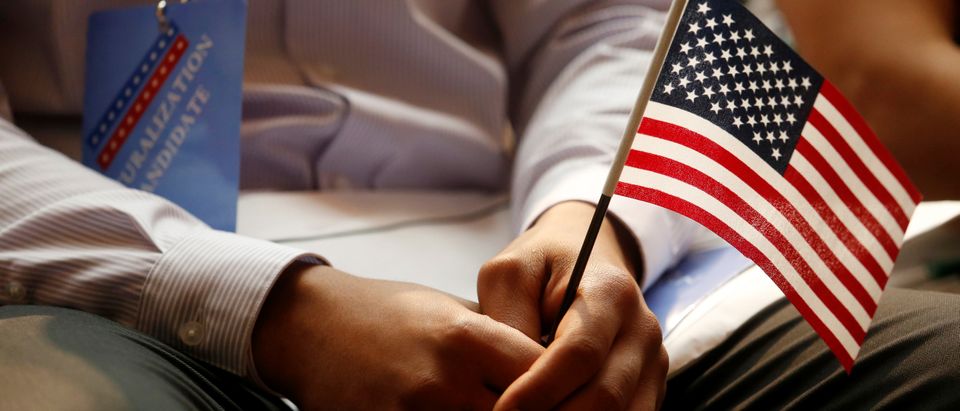Some federal judges handling immigration-related cases are balking at delaying court proceedings during the government shutdown. Such judges are acting differently than courts did during 2013’s shutdown under President Obama.
In 2013, federal courts postponed cases involving Department of Justice (DOJ) attorneys. During this shutdown, most federal courts are apparently doing likewise. Other judges with immigration-related or Trump-centered cases, however, are requiring DOJ attorneys to work pending litigation.
Such judges ignore the Constitution’s limits on their authority. Federal courts, as classically explained in Federalist #78, “have neither Force nor Will, but merely judgment.”
As devotees of the progressive movement, however, many judges reject the Constitution’s structure of separation of powers. Some really believe federal courts should be the most powerful branch of government. They are rightly called “judicial supremacists.”
Supremacist judges have been over-reaching their authority with impunity for many years. They push the limits like speculators who believe stock or real-estate markets will never crash. As Federalist #78 cautions, federal courts must “ultimately depend upon the aid of the executive arm even for the efficacy of its judgments.”
Americans’ respect for courts and the rule of law results in court judgments being routinely implemented. But when a party refuses to comply with a judgment, who enforces it? Judges are powerless on their own. They must rely on U.S. Marshals.
Some federal judges consider U.S. Marshals to be court employees, but they’re not. Marshals are DOJ employees, with some assigned to federal courts. Thus, U.S. Marshals ultimately work for the president.
The Antideficiency Act (ADA), triggered in government shutdowns, illustrates separation-of-powers interplay among the branches. The ADA, Congress’s attempt to restrain executive spending, also applies to the courts. It bars officers and employees from obligating funds Congress has not appropriated. Thus, shutdowns force furloughing of non-essential employees.
In this shutdown, some judges are presuming to have power over executive branch decisions about who is and is not essential. Like the executive, courts decide who of their own employees are essential. Interfering in DOJ’s decisions about essential employees is political, not judicial, action.
To comply with these illegitimate orders, DOJ must either change or ignore its own shutdown plan. If DOJ’s “non-essential” lawyers appear in court, they would be acting as “volunteers.”
The ADA bars volunteering “except for emergencies involving the safety of human life or the protection of property.” The ADA provides that “the term ‘emergencies involving the safety of human life or the protection of property’ does not include ongoing, regular functions of government the suspension of which would not imminently threaten the safety of human life or the protection of property.”
“Knowing and willful” ADA violations constitute crimes.
Nevertheless, a judge hearing challenges to restrictions on asylum-seekers is insisting DOJ lawyers continue working. He claims his case involves” the safety of human life or the protection of property.” But his case doesn’t necessarily meet the ADA’s definition of “emergency.” The judge’s comments reflect his annoyance that 91 percent of Customs and Border Protection workers continue working.
This judge doesn’t disguise disagreement with President Trump’s judgments about safety. He sees asylum seekers; Trump sees invading aliens. The judge likely believes himself duty-bound to block Trump’s border policies. The Constitution, however, makes presidents primarily responsible for defending the country’s safety. Unlike initiating war, which requires a declaration by Congress, the president is obligated to defend the country against attacks and invasions — including by organized caravans.
Judicial Supremacists should reread Marbury v. Madison. Like Federalist 78, Marbury couples the independence of the federal judiciary with the separation-of-powers limits to its authority.
In Marbury, Chief Justice Marshall ruled the Court lacked jurisdiction to order a particular action against Jefferson’s Secretary of State. Marshall also realized that President Jefferson would never enforce any such order. Both sides understood that federal courts lack power and depend ultimately on the president enforcing court orders.
Like Presidents Jefferson, Jackson, and FDR, President Trump does not hesitate to criticize federal judges. Consider what President Trump could — but hopefully will not — do. U.S. Marshals are classified as essential. Some marshals have already been dispatched to the border. What would happen if the president directed more marshals to the border, including those assigned to federal courts? Unavoidably, without marshals for safety protection, courts would close. And federal judges could do nothing but complain.
The Constitution’s Separation of Powers ensures each branch has the ability to defend itself against the other two, ideally producing a peaceful equilibrium. Judicial supremacists distort that structure to favor the judiciary.
Every judge addicted to power should consider the hypothetical of an unpredictable president doing the unthinkable. Re-deploying court-assigned marshals during a shutdown would reveal the powerlessness of judges. It would also provide political leverage, otherwise lacking, against congressional Democrats. Such a hypothetical should remind everyone that the federal judiciary remains “the weakest branch.”
John S. Baker, Jr., Ph.D., is professor emeritus at the Louisiana State University Law Center.
The views and opinions expressed in this commentary are those of the author and do not reflect the official position of The Daily Caller.


